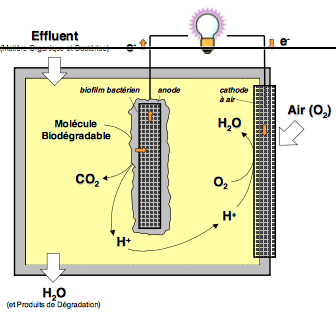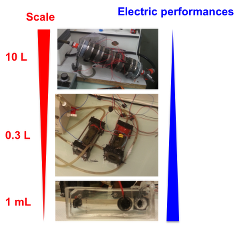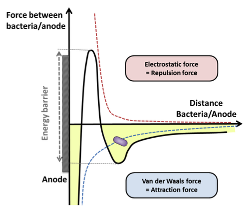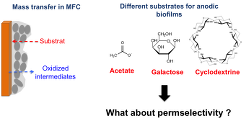Microbial Fuel Cells (MFCs) use bacteria-(biocatalysts) to convert organic matter (fuel) directly into electricity. They are being developed as a novel biotechnology to harvest energy from dissolved organic matter with potential applications ranging from wastewater treatment to power sources for remote environmental sensors.
MFCs are fed with the wastewater containing both the fuel and the bacteria responsible for its degradation. MFC bacteria, or at least some, will oxidize the fuel and use the anode as an external electron acceptor. Electrical power is generated by the electrons flowing from the anode through an electrical circuit to the cathode, where the reduction of an electron acceptor (usually oxygen) occurs.

While electrical performances of MFCs have greatly increased over the past few years, the technology is not marketable yet. Major breakthroughs leading to the reduction of the cost of reactors (e.g., removing platinum at the cathode) or to an increase of conversion yield and electrical performances are still needed and under way.
An interdisciplinary approach
We are developing and optimising MFCs capable of generating electricity while treating wastewater. In this project, we benefit from close ties with microbiologists, electrical engineers and bioengineers present in the Laboratoire Ampere and have developped an interdisciplinary research project addressing the different aspects essential to the technology (bioelectrochemistry, microbiology, electrical and bio-engineering).
Fundamental research
Our main fundamental research interests aim at :
Applied research
Our group is also involved in more applied research and has set up pilot scale MFC reactors at a local wastewater treatment plant in collaboration with the City of Lyon ("Grand Lyon"). Our goals are to :
- Assess the robustness and potential of the technology under real conditions
- Identify the technological barriers
- Adapt and optimize the technology (reactor design, electrode materials, hydrodynamics, electricity storage and use...) for specific sites and applications.
| - - Studying the impact of the bioreactor design, electrode materials, hydrodynamics, on the electricity production. |
 |
Application areas
- Wastewater Treatment (WWTP)
- Treatment of industrial and agricultural effluents
- Energy autonomy
- Waste recovery
- Energy production
Questions or comments : Contact us
Vidéo PACM

See a video of a microbial fuel cell
fed by the effluent of a municipal wastewater treatment
plant, producing electrical energy.
To know more...
Lire : Monier J.M., Haddour N., Niard L., Vogel T. et Buret F. Les biopiles. La revue 3 EI, n° 47, décembre 2006.


